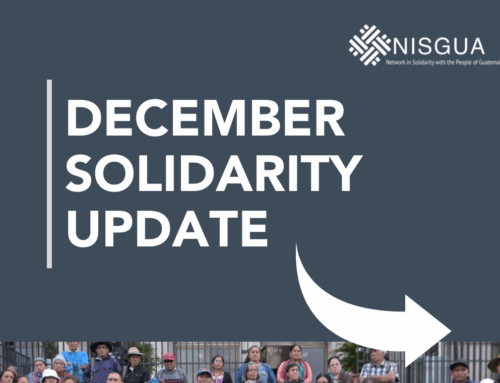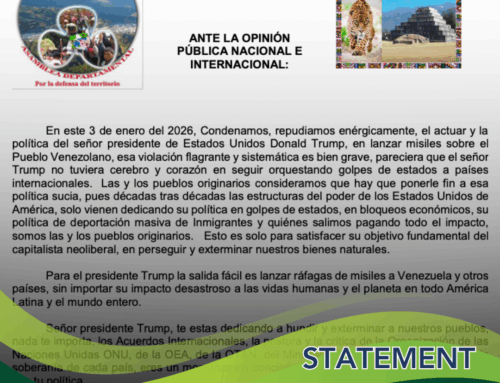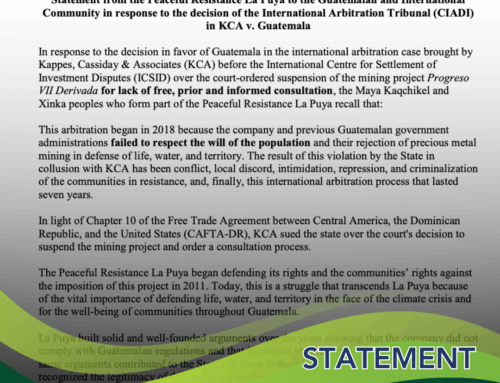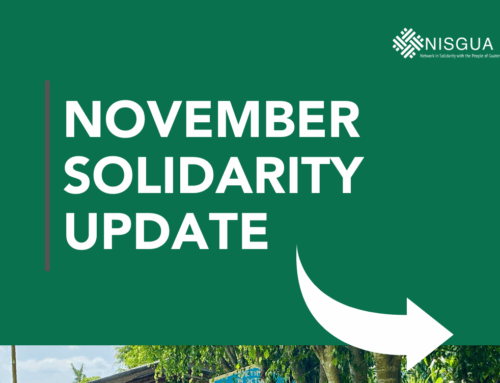News from the Grassroots
- NISGUA Local: Prayerful action on the Equinox at the Ohlone Shellmound and Village Sacred Site
- Partner with NISGUA for our fall speaking tour featuring Indigenous environmental defense
Justice & Accountability
- Genocide retrial moves to Nebaj to hear testimonies from elderly and protected witnesses
- Nearly 40 years later, former military officials stand trial for crimes against the Molina Theissen family
Defense of Life & Territory
- NISGUA's latest report celebrates community organizing to resist the Xalalá Dam
- Communities denounce Tahoe Resources for trying to provoke conflict while operations at Escobal mine continue to be suspended
|
|
NISGUA Local: Prayerful action at the Ohlone Shellmound and Village Sacred Site
As we continue to stand with communities fighting for Indigenous self-determination in Guatemala, we’re compelled to show up locally in support of our Indigenous neighbors fighting to defend their sacred sites from unjust development. A 5,000-year-old Ohlone Shellmound and Village Sacred Site is currently being threatened by a proposed development project in Berkeley, CA, not far from where our U.S. office is located in Oakland.
On March 20, we responded to the call of Ohlone leaders and other activists to gather in prayerful action on the Spring Equinox at the Shellmound. In the call-out, organizers wrote: “Ohlone families are maintaining their resolve to defend the West Berkeley Shellmound burial ground and sacred site. But cynical developers looking to buy and build on this priceless land are now trying to use a new law, SB35, to expedite approval in 90 days - under the guise of affordable housing.”
|
|
TAKE ACTION!
Organizers ask that we call Senators Nancy Skinner and Scott Wiener and urge them to oppose development and help protect this important site ( sample script here).
Follow #SaveTheShellmound and @WBShellmound on Twitter for more information.
Photo by Katie Loncke. Catalyst Project member Donna Wilmott joins in Spring Equinox day of prayerful action in defense of the Shellmound.
|
|
|
Partner with NISGUA for our fall speaking tour featuring Indigenous environmental defense
Are you passionate about linking local and international movements for social and environmental justice? Are you interested in organizing educational events and facilitating exchanges between Indigenous Guatemalan organizers and activist communities in the U.S.? We're in the early stages of organizing our fall grassroots speaking tour, and we want to connect with you!
This year, our tour will lift up lessons from successful organizing in the Ixcán, where Indigenous communities have resisted the imposition of the Xalalá Dam for over a decade. Tentatively scheduled for mid-October, the tour will feature the Association of Communities for Development and the Defense of Land and Natural Resources (ACODET) and will:
- Create opportunities for direct exchange between ACODET and environmental justice activists in the U.S., particularly with movements and organizations led by People of Color, Indigenous people, and/or Central Americans.
- Educate our communities in the U.S. about mega-development projects and movements in defense of life and territory in Guatemala.
- Grow our international solidarity movement by offering concrete ways to take action in support of Indigenous water protectors in Guatemala.
We can't make it happen without you! To learn more about the tour or to make proposals for organizing in your area, contact David Imhoff or call our U.S. office at 510-763-1403. If you or your organization would like to sponsor the tour, make a gift here and write "2018 TOUR" in the memo.
|
|
Genocide retrial moves to Nebaj to hear testimony from elderly and protected witnesses
In February, the three judges hearing the genocide retrial against Efraín Ríos Montt and José Rodríguez Sánchez moved the hearings to the municipality of Nebaj at the request of plaintiffs, to hear from survivors of extreme sexual violence and other elderly witnesses. As Antonio Caba Caba, a survivor and member of the Association for Justice and Reconciliation (AJR) explains, “There are elderly witnesses with health problems. Therefore, it was important to ask for the trial to be moved here so that they have the opportunity to give their testimony, despite the distance. Also, it’s important that the case is here, because it’s here in Ixil territory that there was genocide.”
While the hearings were held mostly behind closed doors, survivors and supporters maintained a constant presence in solidarity outside of the court. They told stories of survival, lifted up their struggle for justice and historical memory, shared food, and displayed a photo exhibit documenting exhumations and judicial processes.
In light of the trial coming to Nebaj, survivors released a statement thanking the court for coming to the region and declaring, “We do not get tired nor will we tire of speaking the truth.”
|
|
|
An Ixil woman looks at the photography exhibit on display outside of the courtroom in Nebaj.
Visit our website for more information on the Ixil genocide case and the decades-long struggle for justice.
|
|
|
Nearly 40 years later, former military officials stand trial for crimes against the Molina Theissen family
After being indicted a year ago on charges of crimes against humanity, the public trial of five former high-ranking members of the Guatemalan military opened on March 1. They stand accused of the illegal detention, torture, and sexual assault of Emma Molina Theissen in 1981 and the subsequent forced disappearance of her 14-year-old brother, Marco Antonio, in retribution for Emma’s escape from detention.
During the armed conflict, more than 5,000 children were forcibly disappeared, but this historic trial marks the first time that former members of the military will answer for these crimes. Through the evidence presented, plaintiffs hope to expose the systematic use of forced disappearance of children as both retribution and an attack on future organizing, as well as the use of sexual violence against women considered to be enemies of the state.
The Molina Theissen family asks that public recognition of the crimes committed against them doesn't stop at the courts. They name the powerful impact the loss of Marco Antonio has had on their family and are demanding that his remains be returned to them for a proper burial. As his sister Ana Lucrecia testified: “I miss him. Something is always missing for me and it’s him, Marco Antonio…We will never give up looking for our brother.”
The Center for Human Rights Legal Action (CALDH) is posting daily bulletins in Spanish with updates from the trial and is broadcasting it live on their site.
|
|
|
Read our latest report, "Water is Life: How to Stop a Dam through Indigenous Resistance," documenting more than 10 years of organizing in the Ixcán to resist the proposed Xalalá Dam.
Report available in Spanish and English. |
|
|
DEFENSE OF LIFE & TERRITORY
|
|
NISGUA's latest report celebrates community organizing to resist the Xalalá Dam
For over a decade, communities in the Ixcán have used resistance strategies based in popular education and unity to successfully prevent the construction of the Xalalá Dam. If built, the dam would be Guatemala’s second largest, and would flood towns, dry up water sources, displace thousands, and destroy the balance that sustains life in the region known as the Ixcán in Quiché and Alta Verapaz.
Read our latest report, celebrating the work of the Association of Communities for Development and the Defense of Land and Natural Resources (ACODET), who have strengthened a regional movement for Indigenous self-determination.
|
|
Communities denounce Tahoe Resources for trying to provoke conflict while operations at Escobal mine continue to be suspended
The Xinca parliament and the Peaceful Resistance of Santa Rosa, Jalapa, and Jutiapa spoke out in a press conference on February 21 against attempts by Tahoe Resources to generate conflict in their communities. The company, whose Escobal mine has been legally suspended since July, “insists on visiting communities to try to coerce people to accept its project” despite the countless public expressions of community opposition. At the press conference, the Resistance denounced the Guatemalan media for its misleading and defamatory coverage of opposition movements in the region, “using language that seeks to criminalize social protest.” This media coverage has significant impacts on the communities organizing to protect their lands from mining who, since 2011, have faced multiple acts of state violence and efforts by the company to criminalize its leaders as a strategy to undermine opposition.
The Xinca Parliament and the Peaceful Resistance believe that media strategies of sensationalizing organizing efforts in the region is part of a broader attempt to influence the outcome of the legal case that has led to the mine's suspension. The Guatemalan Constitutional Court is currently tasked with determining if the Xinca People’s right to free, prior, and informed consent was violated by the Ministry of Energy and Mining in granting the Escobal license - a decision that could close the mine permanently.
On March 7, nearly five months after the case came under its jurisdiction, the Court ordered academic and state institutions to provide them with anthropological studies regarding the presence of indigenous Xinca people in the municipality where the mine is located. In response to the court’s request, the Xinca Parliament’s legal counsel, Quelvin Jiménez, stated, “It is not up to the Constitutional Court to decide if we, the Xinca people, exist or not. This is not a disputed fact. According to jurisprudence set by the Inter-American Court, no court has the right to place in doubt the self-identification of a people. According to the same jurisprudence, as Indigenous people, we have the right to free, prior, and informed consent over large projects - like the Escobal mine - that impact our lives and territory.”
Read the full press statement here and more about the latest court decision here.
|
|
|
|










Leave A Comment